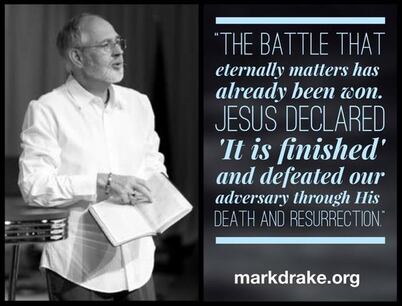|
AskMark Question From Alaska: In your sermon, you said ‘God cannot be disappointed in us...that would be illogical because He already knows our future.’ According to the NIV God does have regrets and logically this means He can be disappointed. What are your thoughts on the matter? If God can have regrets and therefore be disappointed in those He has appointed, does this mean God makes mistakes as well?
Mark’s Response: The short answer is: No, God is not disappointed when His children mess up, God does not have regrets, meaning He never wishes He had done something differently, and He cannot change mind or His nature. However, this short answer is not nearly enough. Truth cannot be based on my opinion or anyone else’s, but His. And this question is far, far too important to simply give an opinion. This question speaks directly to the eternal nature of God and why we can depend on Him completely, wholeheartedly, and throughout eternity. To answer this based on biblical truth, we must dig deeper. We must look at both how words are defined and what God says about Himself. So now for the necessary, much longer answer. (I am well-known for my very long answers to short questions. 😊) 1- Understanding how words are used in Scripture. Anthropomorphism is the attribution of human traits, emotions, or intentions to non-human entities. It is considered to be an innate tendency of human psychology. God frequently speaks in Scripture using anthropomorphic human terms that we can understand. God is a spirit. As such, He does not have hands or feet or wings though some verses use these terms so we can understand. Yet, He is infinitely more complex in His emotions than we can possibly imagine. God is fully capable of feeling “sorry” for the people He loves while fulling knowing what would happen long before it does. And as the eternal God who knows all things, “the end from the beginning,” He is never surprised and would never choose to do anything differently.
0 Comments
A life filled with the fruit of the Spirit is attractive to those who have any desire to know God. New Covenant Grace empowers us to grow in right behavior, bearing His fruit. And that makes the Gospel attractive, desirable, magnetic.
Meditation is a very important part of our fellowship with God. Don’t be afraid of it. Meditation was God’s idea long before New-Agers thought of it and Eastern religions perverted it. What makes the activity of meditation healthy or unhealthy comes from what we meditate on.
New Age thinking generally tells us to meditate by emptying our minds of everything and focus on the material things we want to possess. This tends to promote greed and prideful self-sufficiency. Eastern religions generally teach to meditate by emptying our minds of everything on allowing the "powers of the universe" to fill us. This can be extremely dangerous due to the unseen spiritual forces that delight in messing with people's minds. As believers, if we focus on human effort, just "trying harder," then we frustrate, or neutralize, the transforming grace of God. But, when we humble ourselves by acknowledging we can't change ourselves, we activate His grace and the miracle of transformation begins. After spending over three years with His handpicked disciples, Jesus willingly laid down His life, rose from the dead, and before returning to the Father He spent His last 40 days teaching them about the Kingdom of God.
“He appeared to them over a period of forty days and spoke about the kingdom of God.” (Acts 1:3 NIV) Why Would This Be “New”? The Kingdom of God was not a new concept to the Jewish disciples. But a Kingdom where the King would actually rule from inside the hearts and the mortal bodies of His people? Now that was a new concept. But should it have been “new” to them? This understanding of the “inside out” Kingdom of God, of how the King is going to live and rule within the hearts of believers, should not have been a new idea to the 12. The Old Testament fully explained the coming of the New Covenant and how it would be implemented. (Isaiah, Jeremiah, Ezekiel…just to name a few.) Even To This Day…A Veil But, because of their upbringing within the Second Temple Jewish community of the early first century, they had a “veil” over their eyes when they read the Old Testament promises about the “New Way” that was coming. This is Paul’s explanation: "Was it a pagan holiday? Is it still a pagan holiday, today?" These are questions sincere believers ask every year around this time. To answer these questions requires an understanding of the ancient world, reading Scripture as it is simply written, and the desire to ask with integrity and then act with consistency.
Let's address the last one, first. Xmas! There is no doubt that most nonbelievers leave Christ out of Christmas. Not knowing Him as Savoir and Lord makes it perfectly logical that they would. They are simply acting out of what they are. It is also true that some, perhaps many, believers get caught up in the secular idea of Christmas and miss the opportunity to teach their children about the true "reason for the season!" But, to react to the word, "Xmas," as if it was sacrilege is to misunderstand history. We recently received a question concerning tithing on our AskMark page:
What about tithing? And the use of Malichi in teaching it as a minimum amount of giving... Is this a reasonable teaching or is it a misuse of Old Testament requirement in teaching giving today? Thanks for the question! It is one that many people are asking right now. As more people begin to see that the New Covenant is based more on the responding to the Spirit inside of us and not threats or demands, questions about things we've done based on Old Testament practices naturally come up. What Was The Purpose of Tithing in the Old Testament? The word "tithe" means 10%. It was the basic principle of giving in the Old Testament. It is important to realize that Israel was a nation with all the expenses a nation of people would incur. The building and upkeep of the Temple, the support of the Levites who had no land to farm for their own support, the huge expense of maintaining a monarchy, king's palace, servants, gifts to honor and maintain relationships with other tribes/countries, armies to defend various parts of the kingdom, and many more costs. In the New Covenant, we are His temple, we are all priests, and we do not maintain a monarchy, palace or nation. But, we do have poor who need our help, we do need facilities and equipment to make it possible to minister, and we do need qualified full time workers to help feed and care for the sheep. Is Tithing Taught in the New Testament Epistles? The word "tithe" is not used or taught in the epistles of the New Testament. And to use the "curse" passage in Malachi 3 is a serious misuse of the verse since Christ has clearly "redeemed us from the curse of the law." However, we should not completely ignore the biblical idea of giving 10% to the work of the Lord. In writing to the churches in Corinth, Paul does refer to what the Law teaches about giving as an example for us to consider. He does draw a connection between giving in the Old Testament for the support of the ministering Levites and giving for the support of those who are fruitful enough to the church to enable them to be "full time" in the work. 1 Cor 9:7-14- Who at any time serves as a soldier at his own expense? Who plants a vineyard and does not eat the fruit of it? Or who tends a flock and does not use the milk of the flock? 8 I am not speaking these things according to human judgment, am I? Or does not the Law also say these things? 9 For it is written in the Law of Moses, "YOU SHALL NOT MUZZLE THE OX WHILE HE IS THRESHING." God is not concerned about oxen, is He? 10 Or is He speaking altogether for our sake? Yes, for our sake it was written, because the plowman ought to plow in hope, and the thresher to thresh in hope of sharing the crops. 11 If we sowed spiritual things in you, is it too much if we reap material things from you? 12 If others share the right over you, do we not more? Nevertheless, we did not use this right, but we endure all things so that we will cause no hindrance to the gospel of Christ. 13 Do you not know that those who perform sacred services eat the food of the temple, and those who attend regularly to the altar have their share from the altar? 14 So also the Lord directed those who proclaim the gospel to get their living from the gospel. NASU So Where Does That Leave Us? In the New Covenant:
Galatians 6 tells us the law of sowing and reaping is in the New Covenant and we must grow in our ability to use it correctly and benefit from it. Paul made it simple by stating, "He who plants a little, harvests a little." Sadly, some manipulate people for selfish, greedy reasons. But that doesn't negate the true purpose of the law of sowing and reaping. The real reason for this law? To grow our faith and trust in God to take care of us. All the trials we face are designed to enable us to grow our trust in His faithful care. But, we have no control over when and how those trials come. But we do have a real measure of control over our giving. Choosing to give or not give is the only way we can actually choose to challenge our faith and grow it by choosing to give more. The heart of the matter of giving is this: New Covenant Grace will always lead us to do more than Law ever could. DON'T HELP!!! What strange advice.
Every lifeguard knows the best advice to give when attempting to rescue a drowning person- "Don't help, don't try to swim, just go limp, relax completely in my arms, and we will both make it safely to shore." A drowning person must exhaust themselves as quickly as possible. Better yet, just go limp, relax completely, don’t fight their lifesaver, and let the expert do their job. But, that goes against the natural, powerful instinct to do anything in order to survive. And "doing anything in order to survive," causes the drowning person to unwitting fight against the very one who can save them. What Activates True Grace? And so it is with the mystery and miracle of New Covenant Grace. The simple, most power truth about how New Covenant grace is activated within us can be found in Proverbs 3:34, James 4:6 and 1 Peter 5:5- "God must oppose the proud, but He freely gives His transforming grace to the humble." So, how does this proud/humble idea work? Throughout Scripture, yeast is used to describe puffed up arrogance, human pride that’s void of power, hot air instead of true substance. At Passover, Jewish families would search the house and get rid of all leaven, all yeast. Jesus warned the disciples to “Beware of the leaven of the Pharisees” because their pride twisted their view of Scripture and made their teaching arrogant and powerless. (Matt 16:11-12)
Yeast: Powerful, Infecting and Life-Changing But here Jesus uses the metaphor of how yeast affects dough in a completely new and positive way. “Again he asked, "What shall I compare the kingdom of God to? 21 It is like yeast that a woman took and mixed into a large amount of flour until it worked all through the dough." (Luke 13:20-21 NIV) Here, Jesus uses yeast as a metaphor to describe how the power of His Kingdom spreads from one person to another, infecting and transforming them in the process. When a little yeast is mixed into a large amount of dough, given enough time, the entire lump becomes affected, or “infected”, by the yeast. When the message of His Kingdom is mixed into the human heart it has the power to change lives! Demand or Promise - What Did Jesus Mean By "If you love me, you will keep my commandments"?4/2/2018 We have been asking you to submit questions for Mark to answer as part of the new AskMark section of our site, and a few of them we are featuring here in the blog. Here is a recent question I think many Christians struggle with.
YOUR QUESTION: I wonder why Jesus spoke some "law oriented" verses in NT. For example, John 14:15 "If you love me, keep my commandments." I assume the answer is Jesus was alive at that time or he was talking to his "law oriented" disciples or Paul was not there yet to start the Grace gospel. Can you help? Jim from PA MARK'S RESPONSE: Thanks for helping other people who are wondering the same thing. Your question about why Jesus made so many statements that seem to not only be reinforcing the Law, but raising the bar far higher than Moses did, is very common. In fact, it's one of the most asked questions in our pastors equipping seminars in nations around the world. I realize you were writing from memory, but it's important to note that what Jesus actually said was, "If you love me, you will keep my commandments." I point this out because, as we will see later, this is actually a promise rather than a demand. Think of it as a doctor saying, "If you will take your medicine, you will get well." It's all about cause and effect. So let's wade in. Jesus Was Born Under the Law First, we need to see that Jesus was deliberately "born under the Law." I deeply desire to be a believer who "thinks, meditates, and rolls His Word over and over in my mind." So I was surprised when I first realized that nowhere in the New Testament is the Church referred to as God's Army...never. We are called the Body, family, His building, Church, Bride, etc. But never His army. The angels are called His army but not us. He is the Lord of hosts (angelic armies).
The battle that eternally matters has been won. Jesus declared "It is finish" and embarrassed our adversary by complete defeat through His death and resurrection. The Eph 6 reference to armor talks about our "struggle" against spiritual powers but it concludes with the purpose of our armor "...so you can stand." Stand, not fight. Each piece of armor refers to what we must believe about Him and what He has done for and in us. When Paul wrote that the "weapons of our warfare are not carnal" for the "pulling down strongholds", the context shows he is referring to wrong beliefs built in our minds by our adversary. Paul uses the metaphor of a soldier to show how committed we should be and how others should give so some can "go." Reading Acts, we know he was regularly "run out of town" when riots broke out but he never referred to it as a failure or said, "The devil won." I find it very interesting that when Paul said satan "hindered, blocked our way," he didn't fight but just went on rejoicing! 1 Thessalonians 2:18-20 TNIV [18] "For we wanted to come to you—certainly I, Paul, did, again and again—but Satan blocked our way." Now imagine how we might react to that situation. It certainly "sounds" like the devil won. But the next verse shows that it simply didn't matter to Paul because he lived in rest believing that God would make it all work together for his good. Here's the next verse- [19] "For what is our hope, our joy, or the crown in which we will glory in the presence of our Lord Jesus when he comes? Is it not you? [20] Indeed, you are our glory and joy." And why does this matter? I suggest that the more we see ourselves as God's army, the more we fall prey to a "works mentality." We feel we must fight and then we view victory and failure through the lens of immediate circumstances. We begin to "lean to our own understanding" about the purpose for suffering and trials. We start viewing suffering as direct attacks of the enemy and somehow a failure on our part. But James and Peter said we should rejoice in suffering and trials, not fight anything. Then we starting looking at Old Testament verses to explain our view of warfare. War was real for them because they were setting up a literal nation and because Jesus had not yet "disarmed" all spiritual enemies. Col 2:15 should be our foundational belief. "And having disarmed the powers and authorities, he made a public spectacle of them, triumphing over them by the cross." 1 Peter 3:21-22 TNIV [21] "… It saves you by the resurrection of Jesus Christ, [22] who has gone into heaven and is at God’s right hand —with angels, authorities and powers in submission to him." We are called to a life (not a day) of Sabbath rest, not warfare. I want to grow in my understanding of the Sabbath-Rest referred to in Heb 4:1- "Therefore, since the promise of entering his rest still stands, let us be careful that none of you be found to have fallen short of it." Hebrews 4:9-10 TNIV [9] "There remains, then, a Sabbath-rest for the people of God; [10] for those who enter God’s rest also rest from their own work, just as God did from his." The war is in our minds where we must constantly be renewed so we believe the right things. Jesus gave us a promise about the life He wants to give us. Matthew 11:28-30 TNIV [28] “Come to me, all you who are weary and burdened, and I will give you rest. [29] Take my yoke upon you and learn from me, for I am gentle and humble in heart, and you will find rest for your souls. [30] For my yoke is easy and my burden is light .” Let's pursue joy in trials, peace in suffering and the eternal reward of enjoying His complete victory! How? By fixing our eyes on Him, all He has done and all His Spirit of grace is doing inside of us right now! "...fixing our eyes on Jesus, the pioneer and perfecter of faith." Heb 12:2 This is not intended to be criticism of anyone who has used this phrase. It is simply something to think about. Mark |
AuthorMark Drake is an internationally known author, teacher and leader. He focuses on equipping leaders around the world in New Covenant Grace. Archives
July 2024
Categories |
Ministry Office Locations – St. Louis, Missouri, USA : : Anchorage, Alaska USA : : Penang, Malaysia
Entire contents of this site ©2017 Mark Drake International. All rights reserved. / Mark's branding, creative and website donation by W.A.Latocki > LATOCKI.com / How can you help?













 RSS Feed
RSS Feed
